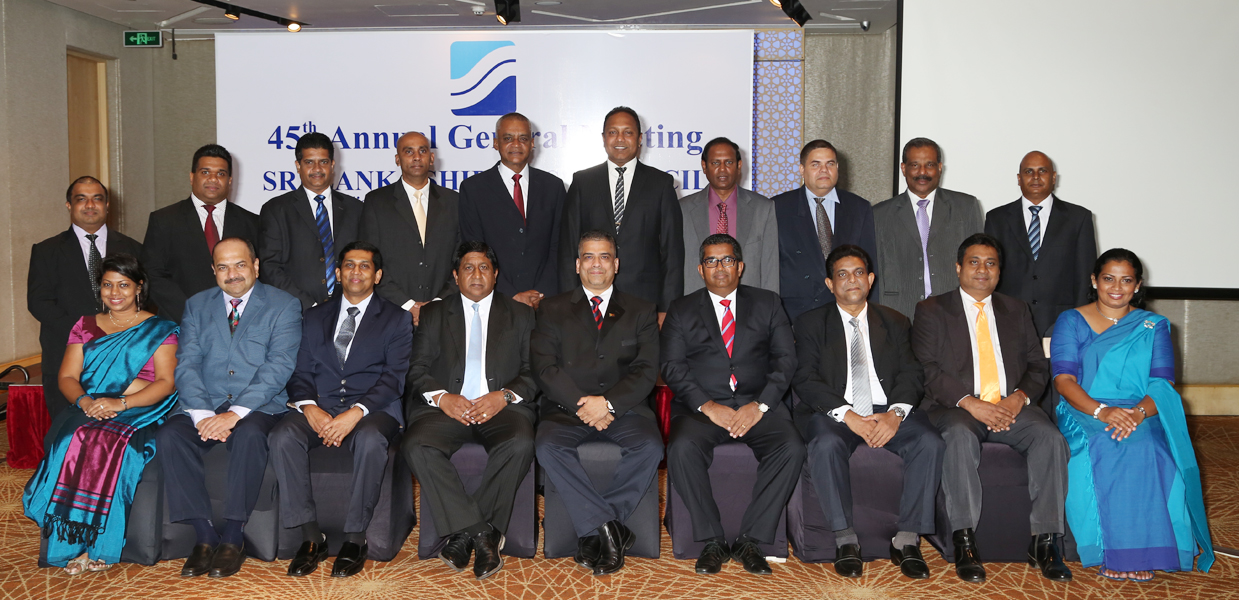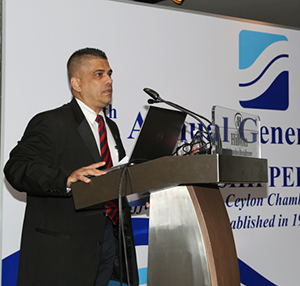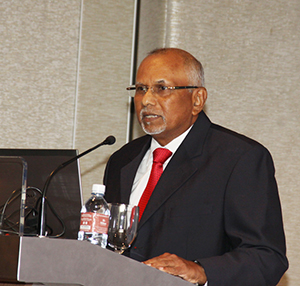

|
|
|
09th August 2015 45th AGM Sri Lanka Shippers' Council 2015-2016
45th Annual General Meeting of the Sri Lanka Shippers' Council was held on 24th July 2015 at Union Ballroom, Hilton Colombo Residences, followed by the Post Business Session and cocktails. Mr. Tissa Wickramasinghe, General Manager Commercial & Marketing, Colombo International Container Terminals Ltd was the Guest of Honour at this occasion. Mr. Sean Van Dort re-elected as the Chairman for the year 2015/2016. Thereafter, Mr. Nalin Silva and Mr. Chrisso De Mel were re-elected as 1st Vice Chairman and 2nd Vice Chairman respectively. Speech by Mr. Sean Van Dort, Chairman of the Sri Lanka Shippers' Council
I extend to you a warm welcome to the post business session of the 46th Annual General meeting of the Sri Lanka Shippers' Council. As you may be aware the Sri Lanka Shippers' Council was established in 1966 and is the apex body of 13 associations representing a wide spectrum of shippers in this country engaged in almost all business activities. By far we are the single organization representing the exporters and importers of this country together with relevant service providers such as freight forwarders. It is my privilege to welcome all of you for this august assembly in which we celebrate 49 years of our existence. Sri Lanka Shippers' Council has extensively engaged in public private partnership dialogues in order to bring about a reform agenda for the benefit of importers and exporters of this country by creating a conducive environment on a market friendly basis. It has never been an easy task and there have been continuous deliberations in the stakeholders particularly the Government in bringing about these changes. Honourable Minister, we are extremely thankful to you for giving directions through the Investment Facilitation meetings to ensure the completion of the electronic documentation system for imports within a period of six months. In fact, you went to the level of covering all details and giving direction to ensure that electronic signage which was an issue will be permitted through due legal process and because of this initiative, Sri Lanka would be the first in this part of the world to engage in import export documentation electronically. The long term vision of this initiative is that we can ensure that by the time goods leave this country it will be reflected in the other country's customs computer automatically and vice versa. It will be a long journey, but we are extremely thankful that the process that we created is being continued uninterrupted with your guided directions. Honourable Minister, the most prominent 24/7 facilitation measure reflects the timely intervention by the Government to address the needs of the hour. Industry also has a responsibility to ensure utilization of this relief by adjusting themselves. The mechanism shall be in place to address the problems, if any, creep up by the system itself rather than seeking intervention. When the electronic documentation system is ready the 24/7 clearance system will augur well the different time zones of countries within which we engage in trading activities. The landmark legislation that was brought about in 2013, where directions were given that in the international carriage of goods, all costs from origin to destination has to be borne by party who is offering the contract to the service provider, has been upheld as a matter of principle internationally not only by the Global Shippers' Forum but by the UNCTAD as well. Honourable Minister, I will be failing in my duty if I do not recall your great involvement in this process. I am sure you will remember that in 2001 when you were the Minister in charge of Trade, having understood the predicament of the shippers in this country, you tried your best to bring about the regulations to control anti-competitive behaviour, in fact you followed the footsteps of the late Honourable Lalith Athulathmudali who did not allow room for any unethical behaviour in the maritime industry. Sir, twelve years later when this regulation was introduced in the Parliament as a budget proposal, you had the capacity and the consciousness while being in the opposition to acknowledge the fact that this proposal in the interest of the country. You upheld the principle that you were driving in 2001, in 2013 as well. This is more valuable, because you yourself is in that business, which was brought under the regulatory mechanism and we salute you for the stance you have taken. In fact, I need to emphasize that the same old fear psychosis were made by the parties with vested interests in 2013 as well, that if we bring about this regulation the ships will not call over, that international buyers will not look at Sri Lanka favourably and could be a space crunch out of our ports, etc., in order to protect their interests. It is needless to say that all those arguments have been disproved and we are continuing to grow. Honourable Minister, we will assure you that we will continue to engage in this dialogue in order to ensure that this market based principle in this industry is adhered to. This market friendly behaviour that was commended by yourself has brought about a definite cost reduction in our day to day operations without any affect either on the port income or on the legitimate income of the service provider because all-inclusive cost now covers all charges from origin to destination. Additionally, even delivery order fees are now being negotiated and agreed by stakeholders with the mediation of the Government authorities. Honourable Minister, Ladies & Gentlemen it is with great pride that I wish to report that the Sri Lanka Shippers' Council, a member of the Global Shippers' Forum will be celebrating its 50 years of existence by simultaneously hosting a Global Shippers' Forum in Sri Lanka. At the last Annual General Meeting of the Global Shippers' Forum held in Toronto, Sri Lanka was awarded the honour to host the next Global Shippers' Forum at the request of the Sri Lanka Shippers' Council which would be a land mark event in the history of the shipping industry in Sri Lanka. It is pertinent to note that the Global Shippers' Forum will be preceded by the first ever International Conference on Maritime Trade and Sectoral Development which will be held towards the end of this year. It will illustrate to the world that the Indian Sub-Continent will play a key role in trade and maritime activities and Sri Lanka is ready to service the demand. All these efforts are focussed towards the logistic advantage we enjoy and reap the benefits of an international maritime nation. Honourable Minister, during the last decade we have been talking about a maritime policy, maritime authority, maritime hub, etc. However, nothing of the sort had reached a finality. Sri Lanka is a nation surrounded by the sea, geographically located along world shipping routes. The maritime shipping service sector can play an extremely vital role in harnessing the logistic advantage in a competitive manner to develop a socialist competitive market economy benefitting the people of this country. We are of the view that the recent declaration of the Maritime week to be held during 21-27 September 2015, is a clear indication that this important logistic advantage is well appearing in the radar of the Government. Therefore, we sincerely believe you as the Minister of Finance being the custodian of the fiscal regime can provide guidance in shaping up the shipping policy as well for the advancement of economic prosperity in the country and we are eagerly awaiting for further reforms in this sector. Thank you Speech by Mr. Tissa Wickremasinghe, General Manager Commercial & Marketing Colombo International Container Terminals Ltd (CICT)Ladies and gentlemen. A very good evening to you all. I would like to thank the chairman for having invited me.
When you see the numbers, it is encouraging but there is a huge amount of room for improvement on those numbers. When ships call port, they come to collect the cargo, the ships follow the cargo, that is the logical order and not the other way around. Weather they are worthwhile to go call that particular port. We are producing domestic cargo or what we call gateway cargo, which you call export cargo. There is an attraction in that. I am not saying transshipment volumes are not an attraction. If during a situation the port is having a majority of transshipment of cargo, the terminal operators run domestic cargo where the volumes are high, where the ships have no choice, they have to call the port. That will be the ideal scenario for us as terminal operators. Then the shipping line becomes the captive market. Now it's the other way around. Now they are dictating the terms. You can't dictate to the others. I am not saying one should dictate to the other. But the logical system is like that now. For the Colombo to develop to a situation where we can make the shipping lines to make it the captive market, that should be our focus now. If and when that happens we are in a commanding position given our geological location to service these ultra large carriers that are coming out as if there is no tomorrow. Ultra large carriers coming out are a good thing for us. But it's a new challenge for all of us. Before I get on to the presentation proper, I would like to make one comment. We had a function a few days ago when the Honorable Minister in charge of Women's Affairs commented that the first dollar, the second dollar and third dollar was coming into the country because of the ladies. I find it a bit surprising that there are not many ladies in the audience. But I believe you as importers and exporters would discount the first dollar since it's given but the second dollar and third, tea, rubber and garment al employing, the majority I assume are mostly women. So we like to see more ladies in our industry, that for sure. I would like to go into my presentation. I am not confusing you with the figures but I would like to present you with some facts. One more thing, I am also the marketing manager for the organization I work for. I can see my boss is in the audience and I need to earn my bonus. So I need to tell you as the winner of the terminal award of the year. BTI cargo International terminals are owned by the china and 50% by the government of Sri Lanka. We were elected as the terminal operator of the year by choice and we won it last month. It's a big plus for CICT but for the port of Colombo as well. CHMICC which is the parent company happens to be the world's second largest global terminal operator. So having such a link in Colombo is a plus for all of us. My bonus is in the pocket now so I will turn to my presentation. For volume 24% is only domestic, we are just 1.1 million. 30% of this is empery. Do you think 700 000 shipping lines want to come to see you. I think not. But why are they coming. Because the terminal operators realize that the government of Sri Lanka continues to invest in the infrastructure. I will grill down the domestic figures so that you get a clearer picture of where we are. Imports on the left hand side. Growth over the last four years, 6%. Displays slide refers to import figures on the slide. You find a lot of empties coming in and going out. Why is that? Simple reason, your import coming in empty. And this comes at a cost for us. That cost is built into your freight. Port of Colombo, domestic vs. transshipment refers to slide, 4% on domestic side, and 1% on transshipment side. There's four years of average growth around 4%, from the 2014 domestic growth by 9%. Transshipment grows by 15%. 2014 April we had to go into operation. We didn't have the volume for operation. Up to 2013 the port of Colombo was functioning not so efficiently, not due to anything wrong with terminals or operations, it was due to the fact that there were operating at 90% of its utilization. So ships had to wait outside. Business that could have been done by Colombo was diverted elsewhere. That 2014 growth is a signal to say that if we have capacity if we can meet the current trend of servicing our carriers. If we have a committee to challenge, we are in business. This year, up to now, up to last month, we had 6% growth where the port of Singapore had a 2.1% drop in volume. We have got new business coming in and it is coming in purely so because Colombo is capable of handling these large carriers. In this regard, I think I will be failing in my duty if I don't mention the names of what was mentioned by the chairman of the Shipper's Council. The late honorable Lalith Athulathmudali who realized in the 80s that Colombo's future was in future transshipment. He developed it at a time when nobody thought of it. And later on, it was followed by the late Honorable Mr. Ashraff, who had the courage to go ahead with the first public private transshipment project. It was done on the law of the project; there was a lot of opposition. But as a minister of the government, he went through with it. I thought I would draw a similar parallel with a similar port, similar volume in our region. Colombo vs. Chittagong. The volume: We've been at 1.1 million at our max last year; Chittagong had 1.6 million at their max. They had an average 9% growth over the year, we had 5% growth. This is pure domestic volume. Our domestic volume was 364. Colombo has 34% empty, Chittagong has 22% empty. What does this mean from the shipping line perspective? Why are we in a situation, because of the fact, which I stated before that consider this government, considers the administrators of the Sri Lanka Ports authority has the courage to move ahead with the infrastructure development. So in addition to these numbers dictating the lines, we have 1 aspect which no competitor can take away from, which is our geographic location. Then we have service delivery which is up to international standard. We have a company like CHIR with a global operator backing it up. These are also pluses. These people have the network to back it up. These are all pluses and we have captured the attention of the global carriers that we are capable of handling them. At this moment, we are the only import terminal which is available only here in the whole of this region. I would now like to talk upon this topic, because wherever I go, I talk about it. It's very important to me. You can see what's happening there. There is a green line there that is the line from Chittagong from Colombo. The two red lines are where the Chittagong lines are going past Sri Lanka. Those two red lines come at a cost to the shipper, a time cost, freight cost. If you look at the graph in the right hand side, Colombo created that volume in 2014, ultra large carriers started calling into Colombo. Of course, this is also directed to various other factors. The total Colombo Chittagong sector was controlled by one operator. So the freight rate was controlled at a very high rate. We came in, we used our network and we introduced a friend there. It's important that I drive the point, of what the government has been doing. Cost of putting up the break water in the south harbor, 485 million dollars funded by Asian Development Bank and partly by the government. Cost of the terminal 550 million dollars, just those two put together over a billion dollars. Another two terminals planned in the same basin. All of this is because there were investors who were willing to come in and put their money in even during the war. So I think it's important that we appreciate the work done by the various governments and continued. It could have been done much faster but better late than never. So in a nutshell, like I said what earlier, the visionary leaderships of our politicians and the continuation of what was being done, the port continues to flourish. Suppliers of international standards, come within the purview of the ports authority. We are just the tenants in their land. I think honorable Minister Mangala Sarmaweera was the minister of ports at that time, he went to US and signed an agreement, we were the first port in that region and it gave us a huge plus to drive US volume. Now I will go into the challenges that we face. Megaships are now an accepted thing. They are building megaships like there is no tomorrow. So we need to gear up to meet increasing new demands. Here I would like to draw a parallel with some of the challenge we face. Garment manufactures please correct me if I am wrong. If you are contracted through one of your buyers to supply 100 000 dozens of Levis jeans every month or every week. Suddenly your buyer sends you an email and says please don't send me any jeans next week. I don't know how you are going to react that to. In our case. We have no problem. They send you an email, which 2500 moves is blank. Now why would they blank it? The supply demand situation, the trade drops. How do you bring it up? So in such situations we have no power as terminal operators though we have dumped billions of dollars. Contractually you can do nothing. I don't know how it works in the garment industry. But all these investments that come into the ports, I would like to show you this slide. The building of these ships cost you all as well. The larger the ship, the lower their cost, so you can negotiate and get better rate. Here is a comparison for the daily supply of tea for an 8500 TU ship compared with 14500 TU. The difference is almost 7 dollar 25 cents. This is only the grading cost. On top of this they have port dues and what not. I am just trying to show you the plus points of this. This is something which we are facing now. Something that I spoke to you earlier. 10% of selling is cancelled. Rates come down. So the internal manager budgeted productivity. I will jump one slide to show you what happens. SHOWS SLIDES I think all three terminals in Colombo can handle this and when this does not happen. Tomorrow one of you will think that I am going to pick up the container. But I have to ship at my cost for the container to reach you. These things have to be put into the cost factors. On the external side, there's competition. Like I mentioned earlier, the transshipment cargo is high. It's here today, it's not here tomorrow. They have no commitments. But if you improve your domestic volume, they have no choice. Beyond competition, we are talking about challenges. There's service delivery. Colombo port can boast about the fact that for the last 10 years we have not had a . Which other port in the region can boast about it. These are factors that shippers will think. But mind you, we are competing with countries like Dubai. So this is the type of challenge we have. I would also like to draw your attention to the regulation. I have no heard anyone talk about this before. We have discussed this issue among ourselves. It is with regards to the implementation of containers verifications. This comes into play, mandatory July next year, I believe. I don't know who is discussing this with whom. But as far as terminals are concerned, this is mandatory. It comes from IMO. These are some of the many regulations that will come in from time to time. We can sit round the table and discuss this. But this is one item that is not negotiable. This comes into play eventually. I don't know where you are with regards to third party certification. You can access the website with regards to the mandatory rule and please do let us know what you think. Once again, thank you very much for inviting me. It was a pleasure talking to you. Thank you. |
|
| Solution by Nidro IT Solutions | All rights Reserved. Sri Lanka Shippers Council |

 Our Chief Guest Hon. Ravi Karunanayaka apologise at the last moment sent his apologies that he will not attend to our AGM due to an avoidable situation. Our Guest of Honour Mr. Tissa Wickramasinghe, past presidents of the Sri Lanka Shippers Council, Heads of Government Agencies, Distinguished guests and friends;
Our Chief Guest Hon. Ravi Karunanayaka apologise at the last moment sent his apologies that he will not attend to our AGM due to an avoidable situation. Our Guest of Honour Mr. Tissa Wickramasinghe, past presidents of the Sri Lanka Shippers Council, Heads of Government Agencies, Distinguished guests and friends; I would like to say briefly is that the port generates the shipping lines for the port that generates the cargo. Port doesn't generate cargo unless the ship is in. For example if you look at the scenario, Colombo has already been established mainly because of its transshipment volume.
I would like to say briefly is that the port generates the shipping lines for the port that generates the cargo. Port doesn't generate cargo unless the ship is in. For example if you look at the scenario, Colombo has already been established mainly because of its transshipment volume.